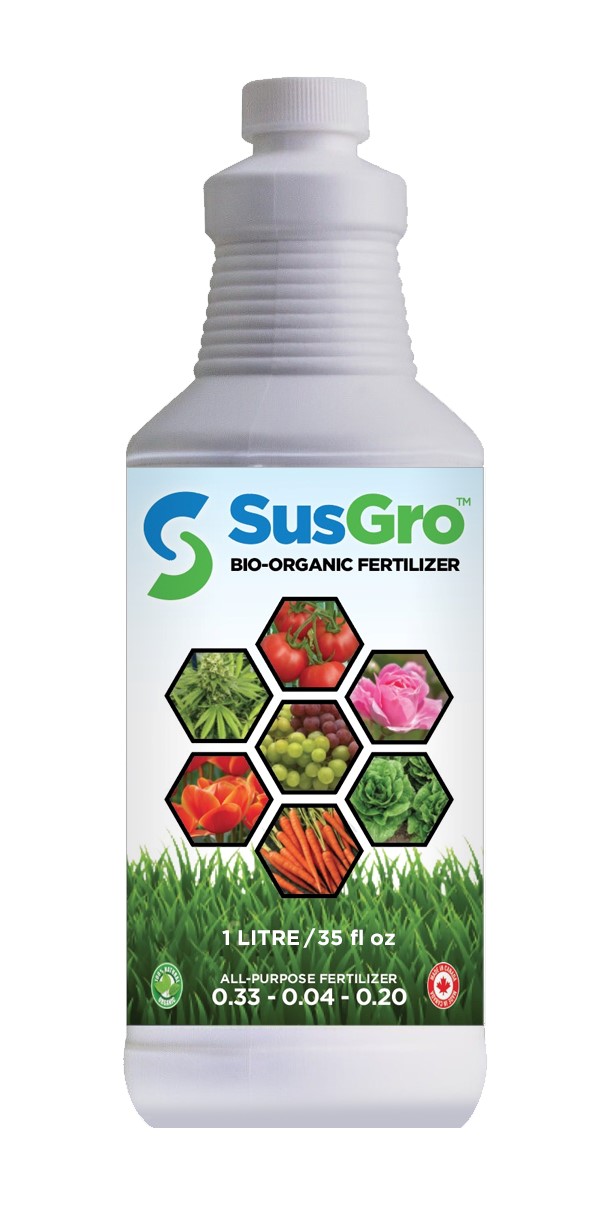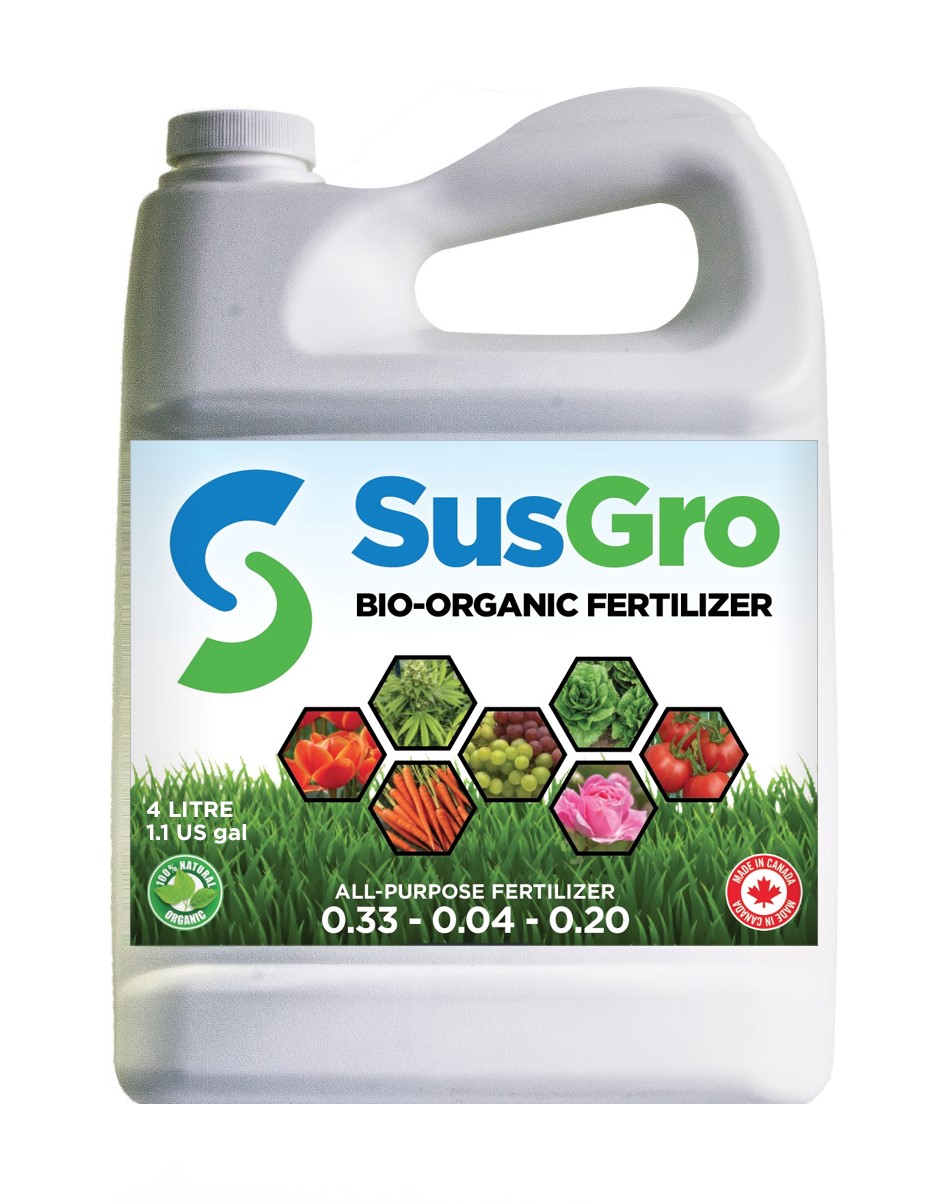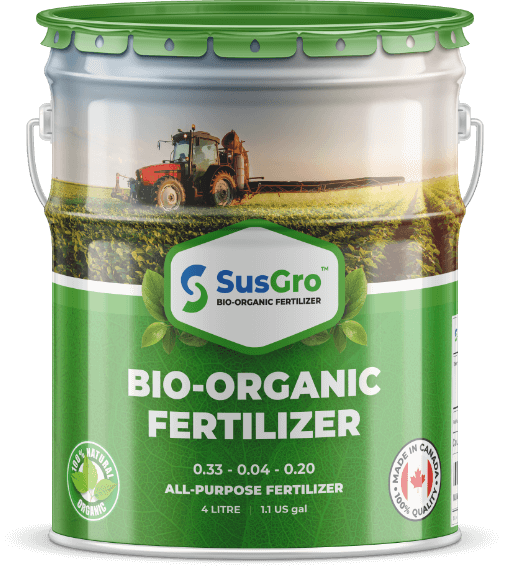SusGro™ BioFertilizer
SusGlobal’s proprietary technology transforms organic waste into a pathogen free recognized organic liquid fertilizer.
SusGlobal’s proprietary technology transforms organic waste into a pathogen free recognized organic liquid fertilizer.
SusGlobal’s proprietary technology transforms organic waste into a pathogen free recognized organic liquid fertilizer.
As chemical fertilizers become less used and alternative sources of valuable organic matter become more difficult to source, SusGro™ pathogen free organic fertilizer provides an economical, sustainable and highly effective alternative to traditional fertilization.
SusGro™ is an organically-based, concentrated organic pathogen free liquid fertilizer product with a full complement of nutrients suitable for a wide range of fertilization requirements.



Today, biofertilizers have emerged as a highly potent alternative to chemical fertilizers due to their eco-friendly, easy to apply, non-toxic and cost effective nature. They make nutrients that are naturally abundant in soil or atmosphere, usable for plants and act as supplements to agrochemicals.
Biofertilizers are best defined as biologically active products or microbial inoculants, namely, formulations containing one or more beneficial bacteria or fungal strains in easy to use and economical carrier materials which add, conserve and mobilize crop nutrients in the soil. In other words, biofertilizer is a substance which contains living microorganisms which when applied to seed, plant surfaces, or soil colonizes the rhizosphere or the interior of the plant and promotes growth by increasing the availability of primary nutrients to the host plant. Organic fertilizers contain organic compounds which directly or by their decay, increase soil fertility. Likewise the term biofertilizers should not be used interchangeably with the terms, green manure, manure intercrop or organic supplemented chemical fertilizer.

At present, one of the new challenges is to obtain more and more agricultural food production from shrinking per capita arable land. Biofertilizers have important and long term environmental implications, negating the adverse effects of chemicals. At the farm level, the gains from increased usage of technology can spill over to other farms and sectors through lesser water pollution than chemical fertilizers and to an extent even organic manures can be created. The gains from the new technology coming through the arrest of soil damage may not be perceived over a short span of time, unlike chemical fertilizers, which yield quick returns. Liquid bio-fertilizers are special liquid formulations containing not only the desired microorganisms and their nutrients but also special cell protectants or chemicals that promote formation of resting spores or cysts for longer shelf life and tolerance to adverse conditions.
Moreover, Biofertilizers, more commonly known as microbial inoculants, are artificially multiplied cultures of certain soil organisms that can improve soil fertility and crop productivity.
Although the benefits of legumes in improving soil fertility was known since ancient times and their role in biological N-fixation was discovered more than 100 years ago, commercial exploitation of such biological processes is of most interest and practice. Latent cells of efficient strains of nitrogen fixing, phosphate solubilizing or cellulolytic micro-organisms are used for application to seed, soil or composting areas with the objective to increase the number of such micro-organisms and accelerate those microbial processes which augment the availability of nutrients that can be easily assimilated by plants.
Not all Plant Growth Regulators (PGR’s) can be considered biofertilizers. There are bacteria that promote plant growth by control of deleterious organisms as bio-pesticides, but not biofertilizers. Similarly bacteria can enhance plant growth by producing phytohormones and are regarded as bio enhancers, not biofertilizers. Biofertilizers play a very significant role in improving soil fertility by fixing atmospheric N, both, in association with plant roots and without it, solubilise insoluble soil phosphates and produces plant growth substances in the soil. Biofertilizers are the preparations containing cells of microorganisms which may be N fixers, P solubilizers, S- oxidisers or organic matter decomposers. In short, they are called as bio inoculants which on supply to plants improve their growth and yield. In present times a need has arisen for organic fertilizers including biofertilizers to minimise our dependence on fertilizer N. The experiments conducted on biofertilizers revealed that legumes such as beans, soybean, chickpea, pigeon pea can fix 50-500 kg atmospheric N/hectare under ideal conditions of environment. Therefore, Bio-fertilizers offer a safe option to utilize renewable inputs to improve the fertility of land using biological wastes with those beneficial micro-organisms which impart organic nutrients to the farm produces.
Biofertilizers have emerged as potential environment friendly inputs that are supplemented for proper plant growth. They hold vast potential in meeting plant nutrient requirements while minimizing the use of chemical fertilizers. These, bio-inputs or bio inoculants, which on supply to plants improve their growth and yield, are the products containing living cells of different types of microorganisms which have an ability to mobilize nutritionally important elements from non-usable form through biological stress. In modern agriculture, due to heavy usage of chemical fertilizers and harmful pesticides on the crops, sustainability of the agriculture systems collapsed, cost of cultivation soared at a high rate, income of farmers stagnated and food security and safety became a daunting challenge. Indiscriminate and imbalanced use of chemical fertilizers, especially urea, along with chemical pesticides and unavailability of organic manures has led to considerable reduction in soil health.
MICRONUTRIENTS: In addition to the macros, SusGro™ provides a variety of valuable micronutrients including high concentrations of Sulphur, Calcium, Iron and Magnesium.
ORGANIC MATTER: SusGro™ is also ideal for building soil structure due to a uniquely high concentration of organic matter in the material. This helps to improve water retention, soil tilth and pore space.
MULTI-YEAR BENEFIT: Similar to manure, SusGro™ is high in organic matter and valuable nutrients that are released slowly, over time, thus providing essential benefits for several years after application.
QUALITY & SAFETY: SusGlobal’s proven, quality controlled, proprietary manufacturing approach leverages a combination of heat treating and high-speed shearing to produce SusGro™. The result is a truly unique organic fertilizer product that is healthy for the soil, safe, reliable and pathogen free.
SUSGLOBAL IS IN THE PROCESS OF UPDATING THE FOLLOWING CERTIFICATES AND LABELS:
SusGro™ DATA
- OMRI CERTIFICATE
- OIM CERTIFICATE
- PRO-CERT ORGANIC CERTIFICATE
CFIA REGISTERED
- SAFETY DATA SHEET

